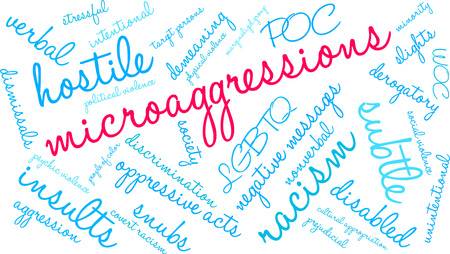Please, say my name, correctly.

April 22, 2021
A microaggression, as defined by the Merriam-Webster dictionary, is “a comment or action that subtly and often unconsciously or unintentionally expresses a prejudiced attitude toward a member of a marginalized group (such as a racial minority)”. Microaggressions are often underestimated and sometimes overlooked in their importance to the long-term effects they can have on an individual and the overall role it has in normalizing racist, stereotypical, and offensive subtle comments on oppressed people. Microaggressions assert inferiority to those on the receiving end of it and in the worst-case scenarios, lead to those same individuals internalizing those comments and then projecting that self-hatred onto their peers. Microaggressions should not be taken lightly or brushed off, they are serious offenses that help contribute to the normalization of the idea of dominant and target groups which consequently creates a further divide in how we see people and their societal status.
While thinking of the act of microaggressions, it’s important to see how it affects others. Therefore, I asked some of my personal friends whom I knew were either international students or who had non-white names about their personal experience of having their name’s constantly pronounced wrong. Some believed it was no big deal because of cultural differences; however, I have had some friends who were bothered by it because it felt as though their identity and presence were not accurately recognized.
First, I asked everyone if they have ever changed their name for the convenience of others since many people have chosen to be called by a nickname to avoid such situations. For the most part, everyone said they hadn’t chosen to go by their nickname but some have stated that they did indeed have one but preferred to go by their given name. One of my friends, Sai Lyon ’22 who often goes by Sai, (pronounced “sigh”), said, “I’ve never changed my name to convince others to like me.” My friends Shriya Balaji ’23, (pronounced “shh–ree–yah”) and Eunjung Lee ’21 (pronounced “uhn–jhong”), on the other hand, viewed it as an “expectation” that they will have to correct their peers and guide them through the pronunciation.
Three out of the four people I interviewed said they do or did have nicknames. I asked them what their nicknames were and why they chose to have American nicknames. Shriya has a nickname but only her close friends call her the nickname, not strangers or peers. Eunjung and Anzhe Chen ’22 (pronounced “an-jhe”) on the other hand have or had nicknames that were used for the sole purpose of making situations easier. Anzhe, who went to Union last year, went by “Yolonda”. Since then, she has changed her nickname to Ann as a way to both pay homage to her true name while making it easy for Americans to pronounce without “totally Americanizing it since Ann is still part of my Chinese name Anzhe.” Eunjung told me she did have a nickname in high school out of “concern” for her high school teacher and friends mispronouncing her name. She allowed them to call her EJ, like her initials, but since then she realized she is not fond of the nickname because it’s not her name; it was a name created to make the lives around her comfortable, not her own.
Both Eunjung and Anzhe said that they understand that their names are not easy for non–native speakers of both Korean and Chinese respectively. Eunjung stated, “sounds of my name don’t exist in the English language. They grew up with certain sounds and learned different [pronunciations of words]. I don’t see how they would pronounce my name correctly unless they’re Korean or know the Korean language.” Anzhe also acknowledged this linguistic difference by stating, “People speak different languages. It’s just like I can’t pronounce a Spanish or French name right, it’s totally understandable.” Anzhe even compared it to American names in China saying “a lot of people don’t speak English [in China] or [they do but] with [a] very strong accent that they can’t even pronounce a simple English name right.” Both Anzhe and Eunjung agree that no one is judgmental because of something one cannot control but it would be helpful for people to try saying their name correctly to make them comfortable even if it makes the other party a bit uncomfortable learning it.
This brings the question: why are people sensitive to this topic? I think it connects to identity. As Sai said, “Just because I grew up saying my name, my name just became part of my identity.” Our names have power and mean something to each individual but when no one puts in any effort into learning it, it hurts. As Eunjung said, “You know [a] name is defined by one’s self and I just feel like I’m not there because no one can pronounce my name. When they mispronounce like “you–n–jung”, that’s actually someone’s name in Korea and I’m not that person. I don’t want others to ruin my name (my grandfather gave me). I don’t want them to hurt my name. So instead of telling them my real name, I want to have another name that they can’t ruin my real name. But I just feel weird about having a name other than my real name. I think my perception of myself gets affected like that.” When I asked people if they were tired of their names being mispronounced, there was a resounding yes of those who regularly have their names butchered. They all understood why, but still got worn down because of it. Eunjung said, “ but sometimes, like when I’m tired, I feel like, ‘who are you calling? Me?’ But you never call me correctly. But when people ask for my nickname, I just feel bad because I don’t have it and I know it’s like English language culture. But my name is that with no nickname.” Shriya had a similar feeling stating, “sometimes I do get tired of it. I’d love for people to get that right but y’know it’s not a name that is very known so patience is required and it might take time for people but if they’re trying that is really great.” Everyone collectively expressed how progress on this issue can be made by simply putting in an effort.
Although microaggressions are common, many people I have asked have stated that they care more about the actions they take to avoid such uncomfortable and tiring situations. Changing one’s habits, in this case, the habit of saying someone’s name a specific way, is a process an individual chooses to go through. That process then shows those around you that you are actively putting in the effort and the care to avoid any sort of offensive situations in consideration of their feelings, further validating their negative feelings and past experiences. This is why microaggressions have weight, even though the person might unconsciously make this mistake it is received as though they are invalidating someone else’s identity. Actions make a difference. All of my friends who had their names constantly mispronounced repetitively said that it gets exhausting continuously correcting people. For the sake of everyone, I urge you and your peers to learn their names, even if you have to ask them again. It is better you learn it and get it correct eventually than to keep both parties uncomfortable. Please, say their name, correctly. Thank you.






